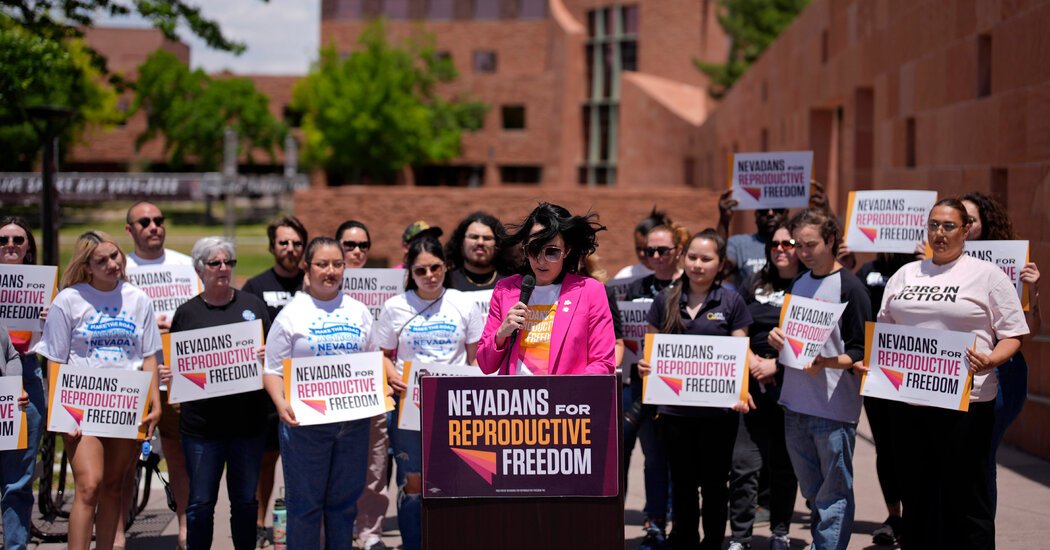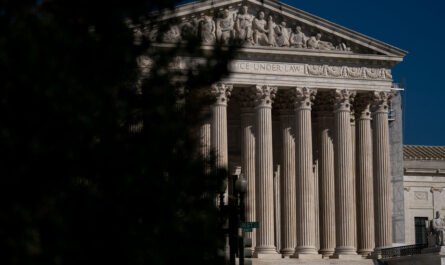Nevada residents will vote on whether to protect the right to abortion in the state this November, as abortion rights groups try to continue their winning streak with measures that put the issue directly before voters.
The Nevada secretary of state’s office certified on Friday the ballot initiative to amend the State Constitution to include an explicit right to abortion after verifying the signatures required. The group behind the measure, Nevadans for Reproductive Freedom, submitted 200,000 signatures in May, nearly 100,000 more than needed. The secretary of state’s office told the group that it had verified just under 128,000 signatures.
Since the U.S. Supreme Court’s Dobbs ruling in 2022, which overturned Roe v. Wade and stripped the constitutional right to abortion, 18 Republican-controlled states have banned the procedure in almost all circumstances or prohibited it after six weeks, before many women know they are pregnant. At least a dozen states, most of them led by Democrats, have passed new protections to abortion since the decision.
The ruling has sparked a movement among abortion rights supporters to enshrine the right to the procedure in state constitutions through ballot measures. They have been successful in putting them on the ballot in at least five other states this year: Florida, Colorado, New York, Maryland and South Dakota. Similar initiatives are also underway in states like Arizona, Arkansas and Nebraska — which all face deadlines to submit signatures this week — and come November, voters in as many as 11 states could get a chance to weigh in.
In Nevada, abortion is legal through 24 weeks of pregnancy. But organizers of the ballot initiative are seeking to amend the State Constitution to protect abortion up to the point of fetal viability — also around 24 weeks — because it is harder to change the Constitution than repeal state law.
“We can’t take anything for granted,” said Lindsey Harmon, president of Nevadans for Reproductive Freedom. “We know Nevada has always been overwhelmingly pro-choice, and there’s no reason it should not be in the Constitution.”
Like abortion rights amendments that passed in Ohio and Michigan, the Nevada measure would allow the state to restrict abortion after viability, except if in the “good faith judgment” of the treating physician, an abortion is necessary to “protect the life or physical or mental health” of the pregnant patient.
After motivating Republican voters for decades, abortion has become a winning issue for Democrats since the fall of Roe, who hope the ballot measures this year will drive turnout on Election Day and boost their odds up and down the ticket. Aside from key swing states like Arizona and Florida, Democrats also hope the measure in Montana — which has yet to be certified but has gathered signatures well over the threshold — will help Senator Jon Tester’s competitive re-election bid.
Polls show a majority of people in most states say abortion should be legal in all or most cases. Voters in seven states have already considered ballot measures related to abortion, and in every case — from states as politically different as California and Kansas — they have sided with abortion rights groups.
Krystal Minera-Alvis, communications director for the anti-abortion group Nevada Right to Life, acknowledged the anti-abortion movement’s losses in those ballot initiatives.
“Right now we’re kind of 0 for 7,” she said. “We’re not doing too great.”
Support for abortion is particularly strong in Nevada, another battleground state. According to the Public Religion Research Institute, 76 percent of residents are in favor of abortion rights, and according to a recent Emerson College poll, 58 percent of Nevadans said they would vote yes on the ballot measure. For the constitutional amendment to take effect, voters would have to approve it both this November and in 2026.
Ms. Minerva-Alvis said her group’s primary goal is to get the word out about Nevada’s existing law, which also allows abortions after 24 weeks if a physician deems it necessary to protect the pregnant patient’s life or health. “If the average Nevadan finds out what the law already is, what’s already legalized, they would not vote for it.”
Among the races in Nevada is one for a Senate seat, in which the incumbent Democratic Senator Jacky Rosen is leading her Republican opponent, Sam Brown. Ms. Rosen has expressed support for the abortion measure, saying it ensures that “every Nevadan can make their own health care decisions, free from government interference.”
Mr. Brown, an Army veteran who has been endorsed by Mr. Trump, has sought to position himself as a moderate on abortion. He has said he would not seek to change Nevada’s abortion law, nor support a national abortion ban.
But Ms. Minera-Alvis said she and others in her movement would like him to be more assertive, and “have more of a pro-life voice” by pushing for a lower gestational limit in the future.
Kate Zernike contributed reporting.




